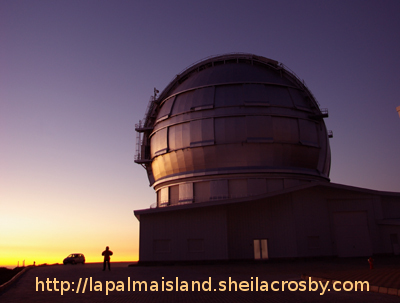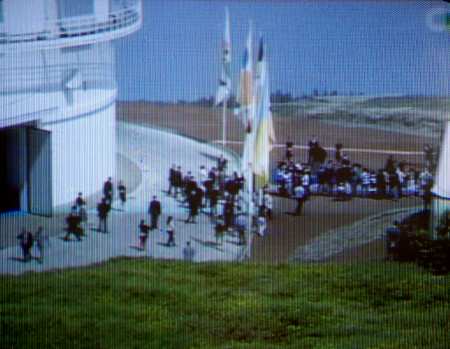
This is GranTeCan (
Gran Telescopio Canario / Big Canarian Telescope) on the Roque de los Muchachos observatory in La Palma. It will be inaugurated on July 24th. The king and queen of Spain are coming, and there are rumours that Dr. Brian May is coming too. The telescope and its first two instruments cost €105 million: 90% of this came from Spain, 5% from Mexico, and 5% from the University of Florida. They'll share the observing time in the same proportions.
They aren't kidding about the "big" part, as it's the biggest telescope in the world. If you took the telescope out of the dome, there'd be room for a tennis court in there. The main mirror is 10.4 metres across. For comparison, the next biggest telescope in Europe, the William Herschel Telescope, has a mirror 4.2 metres across. But while the Herschel's has one big mirror, GranTeCan has 36 hexagonal segments, each over 2 metres from point to point. They're probably the best quality optical surface in the world, too. (The special glass used for ceramic hobs was developed for astronomical mirrors. I bet you didn't know that.)
The aim of all this is to gather more light, which means that the telescope can see fainter, hence more distant objects then anyone's seen before. Since light takes time to travel, that means it's looking back in time. They don't know exactly what they'll discover. That's the whole point.
Galileo's first telescope was enough for him to see sunspots, Jupiter's moons and the phases of Venus (it waxes and wanes, like the moon) and get him into terrible, terrible trouble with the Church. All that with a telescope diameter of about 4cm.
I'm looking forward to see what Grantecan finds with an extra 10.36 metres.
Labels: astronomy, GranTeCan, observatory, Roque de los Muchachos
Bookmark with:

 Del.icio.us
Del.icio.us
 Digg
Digg
 Reddit
Reddit
 Facebook
Facebook
 Furl It
Furl It
 Newsvine
Newsvine





